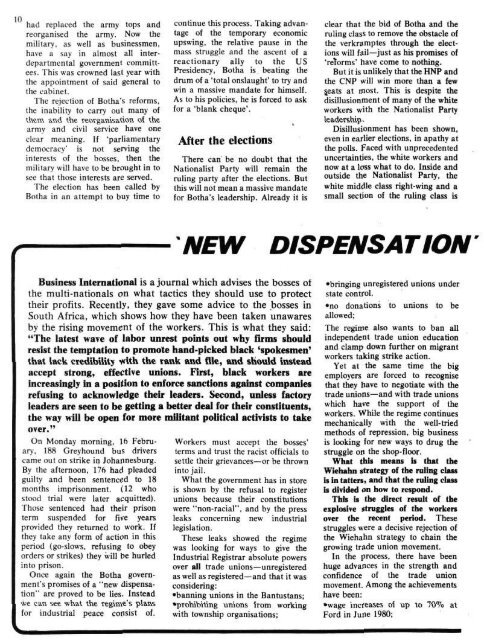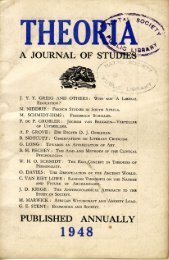Inqaba ya basebenzi Number 2 April 1981 - DISA
Inqaba ya basebenzi Number 2 April 1981 - DISA
Inqaba ya basebenzi Number 2 April 1981 - DISA
Create successful ePaper yourself
Turn your PDF publications into a flip-book with our unique Google optimized e-Paper software.
10 had replaced the army lops and<br />
reorganised the army- Now the<br />
military, as well as businessmen,<br />
have a say in almost all inter<br />
departmental government committees,<br />
This was crowned last year with<br />
the appointment of said general lo<br />
the cabinet.<br />
The rejection of Botha's reforms,<br />
the inability to carry out many of<br />
them and the reorganisation of the<br />
army and civil service have one<br />
clear meaning. If 'parliamentary<br />
democracy* is not serving the<br />
interests of the bosses, then the<br />
military will have to be brought in to<br />
see that those interests are served.<br />
The election has been called by<br />
Botha in an attempt to buy time to<br />
continue this process. Taking advantage<br />
of the temporary economic<br />
upswing, the relative pause in the<br />
mass struggle and the ascent of a<br />
reactionary ally to the US<br />
Presidency, Botha is beating the<br />
drum of a 'total onslaught* to try and<br />
win a massive mandate for himself.<br />
As to his policies, he is forced to ask<br />
for a "blank cheque 1 .<br />
After the elections<br />
There can be no doubt that the<br />
Nationalist Party will remain the<br />
ruling party after the elections. But<br />
this will not mean a massive mandate<br />
for Botha's leadership. Already it is<br />
Business International is a journal which advises the bosses of<br />
the multi-nationals on what tactics they should use to protect<br />
their profits. Recently, they gave some advice to the bosses in<br />
South Africa, which shows how they have been taken unawares<br />
by the rising movement of the workers. This is what they said:<br />
"The latest wave of labor unrest points out why firms should<br />
resist the temptation to promote hand-picked black 'spokesmen*<br />
that lack credibility with the rank and file, and should instead<br />
accept strong, effective unions* First, black workers are<br />
increasingly in a position to enforce sanctions against companies<br />
refusing to acknowledge their leaders. Second, unless factory<br />
leaders are seen to be getting a better deal for their constituents,<br />
the way will be open for more militant political activists to take<br />
over."<br />
On Monday morning, lb February,<br />
188 Greyhound bus drivers<br />
came out on strike in Johannesburg.<br />
By the afternoon, 176 had pleaded<br />
guilty and been sentenced to 18<br />
months imprisonment. (12 who<br />
stood trial were later acquitted).<br />
Those sentenced had their prison<br />
term suspended for five years<br />
provided they returned to work. If<br />
they take any form of action in this<br />
period (go-slows, refusing to obey<br />
orders or strikes) they will be hurled<br />
into prison.<br />
Once again the Botha government's<br />
promises of a "new dispensation**<br />
are proved to be lies. Instead<br />
we can see what the regime's plans<br />
for industrial peace consist of.<br />
clear that the bid of Botha and the<br />
ruling class to remove the obstacle of<br />
the verkramptes through the elections<br />
will fail—just as his promises of<br />
'reforms' have come to nothing.<br />
But it is unlikely that the HNP and<br />
the CNP will win more than a few<br />
Seats at most. This is despite the<br />
disillusionment of many of the white<br />
workers with the Nationalist Party<br />
leadership.<br />
Disillusionment has been shown,<br />
even in earlier elections, in apathy at<br />
the polls. Faced with unprecedented<br />
uncertainties, the white workers and<br />
now at a loss what to do. Inside and<br />
outside the Nationalist Party, the<br />
white middle class right-wing and a<br />
small section of the ruling class is<br />
NEW DISPENSATION<br />
Workers must accept the bosses'<br />
terms and trust the racist officials to<br />
settle their grievances—or be thrown<br />
into jail.<br />
What the government has in store<br />
is shown by the refusal to register<br />
unions because their constitutions<br />
were "non-racial", and by the press<br />
leaks concerning new industrial<br />
legislation.<br />
These leaks showed the regime<br />
was looking for ways to give the<br />
Industrial Registrar absolute powers<br />
over mil trade unions—unregistered<br />
as well as registered—and that it was<br />
considering;<br />
•banning unions in the Bantustans;<br />
•prohibiting unions from working<br />
with township organisations;<br />
•bringing unregistered unions under<br />
state control.<br />
•no donations to unions to be<br />
allowed;<br />
The regime also wants to ban all<br />
independent trade union education<br />
and clamp down further on migrant<br />
workers talcing strike action.<br />
Yet at the same time the big<br />
employers are forced to recognise<br />
that they have to negotiate with the<br />
trade unions—and with trade unions<br />
which have the support of the<br />
workers. While the regime continues<br />
mechanically with the well-tried<br />
methods of repression, big business<br />
is looking for new ways to drug the<br />
struggle on the shop-floor.<br />
What this means is that the<br />
Wiehahn strategy of the ruling class<br />
U In Utters, and that the ruling class<br />
Is divided on how to respond.<br />
I his is the direct result of the<br />
explosive struggles of the workers<br />
over the recent period. These<br />
struggles were a decisive rejection of<br />
the Wiehahn strategy to chain the<br />
growing trade union movement.<br />
In the process, there have been<br />
huge advances in the strength and<br />
confidence of the trade union<br />
movement. Among the achievements<br />
have been:<br />
•wage increases of up to 70% at<br />
Ford in June 1980;
















